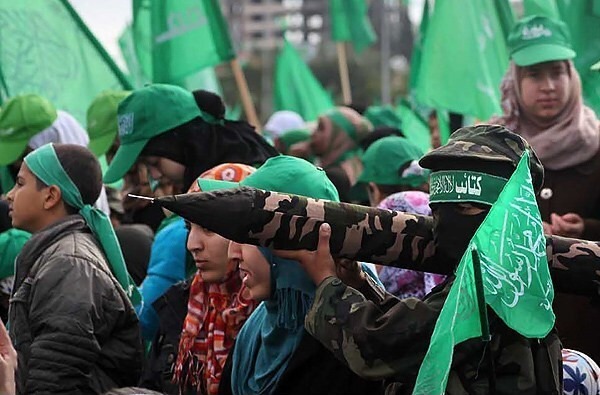An interview with former senior Hamas officials published in Middle East Policy revealed insight on the group’s views and goals.
More than 100 days and 25,000 civilian deaths into its assault on Gaza, Israel has struggled to achieve its goals of rescuing the hostages taken in the brutal October 7 attack and destroying Hamas. The failure to secure “complete victory,” despite publicly projecting confidence, has Prime Minister Benjamin Netanyahu on increasingly unstable ground at home.
A new round of diplomacy ongoing since the new year has produced a radical proposal in Tel Aviv’s hostage-return efforts: to allow senior members of Hamas to leave the Gaza Strip. Part of a larger effort revolved around securing a ceasefire, the suggestion aims to weaken Hamas’s grip on Gaza and allow Israel more security control.
Despite the proposal, Israel has not been shy about its intention to hunt down the group’s leadership around the world. Earlier this month, the deputy head of Hamas’s political bureau was assassinated in Beirut.
Hopes for a deal are slim, however, as Netanyahu recently rejected other potential terms from Hamas that included Israel withdrawing and the group remaining in power in Gaza. The refusal “means there is no chance for the return of the captives,” said a Hamas official.
During the Second Intifada, Middle East Policy published an interview from Roger Gaess with several senior members of Hamas: Sheikh Ahmed Yassin, Abd al-Aziz Rantisi, Ismail Abu Shanab, and Mahmoud al-Zahar, all of whom were deeply involved in the organization as founders, leaders, and spokespeople. Featured in the journal’s new Gaza War issue, the key figures to the inception and growth of Hamas discuss the US role in the conflict, the potential of a two-state solution, and their group’s goals.
Fundamental to the group’s aim, all members assert, is bringing an end to Israel’s occupation: “Until the occupiers leave, we’ll continue our struggle,” said Rantisi. “All Palestinians see the Israeli occupation as a threat to their lives, existence and dignity, so they will resist until the Israelis withdraw,” Abu Shanab asserted.
On the perpetual question of a two-state solution, Hamas’s acceptance hinges on Israel’s recognition of Palestinians. “Our recognition of an Israeli state is conditioned on their recognition of our rights. Since we still don’t have a state…we’re not in a position to recognize Israel,” explained Yassin. What role, Gaess asks, can the US play in seeking an end to the conflict?
Al-Zahar, who has been involved with the group since its founding in 1987, argued that “America, as the sole superpower, should support justice. American interests will not be served by blind support of Israel against the Palestinian people… people in America need to inform themselves about what is happening.” Still holding a role in Hamas’s political bureau, he has continued to assert their philosophy, saying in recent years that “resistance is winning even if Hamas vanished.”
In the midst of the ongoing war, Hamas’s current leadership still voices this rhetoric. While reports of ceasefire negotiations circulate, a senior spokesperson stated that “any agreement must be based on ending the aggression and the occupation’s complete pullout from Gaza Strip.”
Among the major takeaways readers can find in Roger Gaess’s Middle East Policy article, “Interviews from Gaza: What Hamas Wants”:
- The Hamas officials highlighted the significant power imbalance Palestine faces, particularly in the lack of international support and access to military technology.
- Hamas was forced to develop whatever defense they could and learned the magnitude of “martyr operations.”
- All agreed that the intifada and general armed struggle will not cease until Israel proves it is willing to end its occupation.
- Some noted that they were willing to accept an agreement based on the 1967 borders, while others hinted that they were seeking all of historic Palestine.
- Several noted that the intifadas were based primarily on defense, with resistance second.
- Ismail Abu Shanab: “Our resistance is a symbol of our rejection of the Israeli occupation…resistance is an affirmation of Palestinian determination not to surrender.”
- Responses to the question of the Israeli fear of an Arab demographic majority:
- Abu Shanab: “If there is willingness to live in peace, demographics don’t have to be a problem… The Israelis want a purely Jewish state. What does this mean other than apartheid?”
- Abd al-Aziz Rantisi: “So, because they fear being a minority, four million Palestinians should live in misery for life? You are speaking about religion – a ‘Jewish’ state. We can’t accept a state that’s solely for Jews. It’s not allowed for another religion [other than Islam] to govern this land.”
- Several were presented the question of Hamas possibly seeking an Islamic state, and all answered either vaguely or redirected.
- It was noted that Hamas was seeking a democratic state—claiming the likelihood that, with democracy, it would become an Islamic state—and that they were willing to embrace diversity of religion and race.
- Many highlighted that Hamas required more clarity and sincerity from Israel to make clear their goals and requirements for peace.
- All interviewees encouraged the United States to reconsider their role, particularly in their supplying of military technology and funds to Israel.
- Several also encouraged the US to stop attempting to employ the Palestinian Authority against Hamas for the benefit of Israel.
- Other key issues raised:
- The right of return for refugees must be guaranteed.
- Recognition of Israel depends on their recognition of Palestinian rights.
- Israel must stop attacking Palestinian civilians for Hamas to do the same.
- The Oslo Accords and other negotiations have put the Palestinians at a disadvantage.
- Operations are not based on Israel being Jewish, but on its status as an occupier.
You can read “Interviews from Gaza: What Hamas Wants” by Roger Gaess in the special Gaza War issue of Middle East Policy.
(Banner image: Fars Media Corporation)
